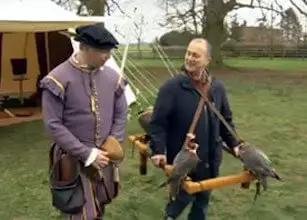An old man, especially one who is eccentric, curmudgeonly or grotesque.
Old codger
What's the meaning of the phrase 'Old codger'?
What's the origin of the phrase 'Old codger'?
An episode of the UK Channel4 archaeological series Time Team, in April 2009, featured an item on falconry. A falconer, suitably dressed in mock-tudor doublet and hose, explained that the frame that was used to carry falcons to the field was called a cadge (probably a variant of cage).
Frame carrying was said to be a job for elderly falconers, who came to be called ‘old cadgers’ and later, ‘old codgers’. He also threw in for good measure that this was also the derivation of ‘cadging a lift’ (a.k.a. ‘cadge a ride’).
Time Team includes senior academics who expect a good standard of historical and archaeological evidence to support theories about the origins of the buildings and the artefacts that they dig up. Regrettably, those standards go out of the window when it comes to words and phrases. The ‘old codger’ assertion came with no evidence at all and yet it was confidently broadcast as fact. In truth, it is a highly dubious claim.
The ‘cadge a lift’ theory is certainly wrong. That phrase isn’t known until the 19th century, well after falconry had become uncommon and, in any case, that ‘beg/borrow’ meaning of cadge was in use as a general term for ‘obtaining without payment’ and only later became used in ‘cadge a lift’. As to ‘old codger’, it is the begging sense of cadge rather than the falcon transport meaning that is much more likely to be linked to ‘cadger’ and later ‘codger’.
The earliest meaning of ‘cadger’, which pre-dates the naming of falconry cadges by a good two hundred years, was as the name of itinerant dealers who traded in butter/eggs etc., which they transported by pack-horse. This dates from the 15th century and was referred to in Robert Henryson’s The Morall Fabillis of Esope, circa 1450:
“A Cadgear, with capill and with creils”. [horse and baskets]
Over time, less respectable tramps, beggars and smugglers also began to be called cadgers. Cadging changed from ‘trading’ to begging/borrowing’. By the early 19th century, any ne’er-do-well who made a living by questionable means might be called a cadger. William Hone’s The Every-day Book, 1825, lists that meaning:
“A rosinante [a worn-out horse], borrowed from some whiskey smuggler or cadger.”
Note: Rocinante was the name Don Quixote’s horse in Miguel de Cervantes’ celebrated story. The name rosinante doesn’t appear in English until the 1740s, a good hundred years after the Don Quixote story, and appears to have been adopted into English from Cervantes original coinage.
It is worth throwing in here that ‘codger’ is Turkish for ‘old man’ but, as there are no known sources that point to ‘old codger’ being of Turkish origin, it seems safe to class that as simple unrelated coincidence. The origin of codger appears to lie in the complex links between cadger and codger (not as a contraction of the 20th century slang term ‘coffin-dodger’, as one of my more inventive correspondents has suggested). In some parts of England the two words were used interchangeably, whereas in other regions they were separate words, one meaning ‘beggar’ and the other ‘eccentric/grotesque fellow’. The latter meaning is the one used in an early example of ‘old codger’, David Garrick’s farce Bon Ton, 1775:
“My Lord’s servants call you an old out-of-fashion’d Codger.”
Men who had fallen on hard times and had resorted to any means possible to keep body and soul together were often those who were too old to find work. A cadger was likely to be a grizzled character wanting to borrow or steal from you; a codger was a peculiar and unfashionable chap, and both were likely to be old. ‘Old codger’ is most likely to be the linguistic merging of all those images. What is less likely is that the first such codger was seen carrying a cage of falcons.
The history of “Old codger” in printed materials
Trend of old codger in printed material over time
Browse more Phrases
About the Author

Phrases & Meanings
A-Z
A B C D E F G H I J K L M N O P Q R S T UV W XYZ
Categories
American Animals Australian Bible Body Colour Conflict Death Devil Dogs Emotions Euphemism Family Fashion Food French Horses ‘Jack’ Luck Money Military Music Names Nature Nautical Numbers Politics Religion Shakespeare Stupidity Entertainment Weather Women Work
How did we do?
Have you spotted something that needs updated on this page? We review all feedback we receive to ensure that we provide the most accurate and up to date information on phrases.
